Featured
June 12: The key actors

Wale Elegbede and Temitope Ogunba nke chronicle key actors in the June 12, 1993 presidential election
Ibrahim Babangida
The then Military President eclipsed his eight-year reign (1985- 1993) with the annulment of the June 12 presidential election. He had after four years in power (1989) came up with the idea of two political parties – Social Democratic Party (SDP) and National Republican Convention (NRC) and urged all Nigerians to join either of the parties.
The legislative elections went ahead as planned, with the SDP winning majorities in both houses of the National Assembly, but on 7 August 1992, INEC annulled the first round of presidential primaries, alleging widespread irregularities. On 4 January 1993, Babangida announced a National Defence and Security Council (NDSC), of which he was president, while in April 1993, the SDP nominated Abiola as its presidential candidate, with the NRC choosing Bashir Tofa to run for the same position.
On 12 June 1993, a presidential election was finally held, but Babangida annulled the election and issued a decree banning the presidential candidates of both the NRC and the SDP from running in new presidential elections that he planned to hold in the interest of the country.
What ensued were widespread riots, strikes and protests, particularly in the South-West, where Abiola hailed from. On 6 July 1993, the NDSC issued an ultimatum to the SDP and NRC to either join an interim government or face yet another round of elections, with Babangida then announcing that the interim government would be inaugurated on 27 August 1993.
The civil actions brought all economic activities in the country to a halt, forcing Babangida to announce that he was stepping aside as head of the military regime on August 26, and handing over the reins of government to Chief Ernest Shonekan. Babangida, however, some years ago, explained that he was compelled to nullify the poll because of security threats to the enthronement of a democratic government at the time.
Sani Abacha
General Abacha overthrew the Ernest Shonekan-led Interim National Government on November 17, 1993. His accession to power led to the formation of National Democratic Coalition (NADECO) to press for the revalidation of the June 12, 1993 presidential election and the reinstallation of all democratic structures.
But, Abacha opted for a National Constitutional Conference, which was massively boycotted, especially in the South-West. Abacha responded by clamping down on pro-democracy activists. It followed up with Abiola’s arrest and arraignment for treason after he declared himself president.
This led to an industrial action by oil workers as well as outbreak of riots in the south western states, especially Lagos, Oyo, Ondo and Ogun. Again, Abacha responded by sacking the Executive Council of NUPENG, PENGASSAN and NLC; closed down three newspapers: Punch, Concord (owned by Abiola) and The Guardian. He further clamped down on pro-democracy activist like elder statesman, Chief Anthony Enahoro; former Chief of Defence Staff, General Alani Akinrinade, former governor of Kwara State, Chief Cornelius Adebayo and a former governor of Kaduna State, Alhaji Balarabe Musa.
The Abacha-led junta went ahead to promulgates decrees, which put its actions beyond legal challenge in the courts, but the National Democratic Coalition (NADECO) emerged as a pro- test movement for the revalidation of the annulled June 12 election and eventually assuming the unofficial status of an opposition group. It was under Abacha that Abiola’s senior wife, Kudirat was murdered in Lagos. Early in 1998, Abacha announced that elections would be held that August, with a view toward handing power to a civilian government on October 1, but it soon became clear that he had no intention of relinquishing power. The picture became clearer when the five parties in existence then endorsed him as their sole presidential candidate, but he died on June 8, 1998.
Babagana Kingibe
Kingibe first served as National Chairman of the Social Democratic Party (PDP) before he joined the 1993 presidential race. He however lost to Abiola in the primaries, after much prodding from SDP governors; he was selected by the Abiola as vicepresidential running mate, creating a Muslim-Muslim ticket which was initially thought to be a deal breaker in the general elections.
The pair however proved bookmakers wrong by winning the electoral majority although the result was annulled. Kingibe later joined Abacha as Foreign minister, a position he held between 1993 and 1995. He also served as Minister of Internal Affairs, Minister of Power and Steel and ambassador to Greece and Pakistan. In June 2007, he was appointed Secretary to the Federal Government of Nigeria. He was unceremoniously removed from office on September 8, 2008 by the President, Umaru Yar’Adua after spreading rumors about the President’s ill-health while believed to be contending for the presidency
Frank Kokori
Many Nigerians have not forgotten the role played by former General Secretary of Nigeria Union of Petroleum and Natural Gas Workers (NUPENG) in the quest to re-validate the June 12, 1993 presidential election, which was annulled by General Ibrahim Babangida. Though he was forbidden by law to play politics as a unionist, Kokori mobilized NUPENG and the Petroleum and Gas Senior Staff Association of Nigeria (PENGASSAN) to embark on strike to protest Babangida’s annulment of the election. The crisis that ensued forced Babangida to relinquish power to Chief Ernest Shonekan, who was hurriedly installed as head of an Interim National Government (ING).
Thereafter, Kokori joined Abiola to fight for the actualisation of the June 12 mandate. When Abacha ousted Sonekan, he offered Kokori a ministerial post, which he turned down. He rather insisted on Abiola’s inauguration as president. But, when it became clear the Abacha was out consolidate power, Kokori called for an indefinite strike by NUPENG and PENGASSAN. Both unions and the Nigeria Labour Congress (NLC) were proscribed, but the strike continued. Kokori then went underground. He was later arrested in Lagos, brutalized and taken to Abuja. For four years thereafter, he was detained in Bama Prison, Borno State. He did not regain his freedom until June 16, 1998 after Abacha’s death.
Tony Anenih
The former Minister of Works was National Chairman of the Social Democratic Party (SDP) at the time Abiola contested the presidential election. Though he was scathingly criticised over his role in the annulment saga, he stated his own side of the story, during the 23rd anniversary of June 12, last year.
In his autobiography titled: “My Life and Nigerian Politics,” Anenih said contrary to the public views, he stood up to Babangida several times over his proposition to go for fresh elections after the cancellation. He also claimed that Abiola, in his relationship with Babangida was too trusting, even in the face of the general’s many unfriendly actions.
He cited many instances when Babangida refused to release the promised funds to Abiola to prosecute his campaign, forcing him, (Anenih) to borrow money from a commercial bank.
Anenih further claimed that because of his objection to a fresh election during a meeting with the two parties then, Babangida directed one of his aides, Brig-Gen. Halilu Akilu to show him various documents, which showed why the military did not want Abiola as their president. According to him, when the military could not succeed in its plan for a fresh election, it started toying with the idea of the Interim National Government (ING).
Bashir Tofa
The Kano born politician was the NRC candidate in the annulled June 12, 1993 presidential election. He defeated Pere Ajunwa, Joe Nwodo and Dalhatu Tafida in the primaries to clinch the NRC ticket.
He picked a former governor of the now defunct Central Bank of Biafra At the time, Sylvester Ugoh, running mate in the election. Though results released by the electoral commission showed that Tofa lost the election to Abiola, the former insisted that there was no evidence that he lost the poll. According to him, Abiola’s purported victory was all conjecture.
Arthur Nzeribe
The former senator was the promoter of the Association for Better Nigeria (ABN), which backed Babangida in the annulment of June 12, 1993 presidential. ABN had earlier brought a suit before an Abuja High Court, presided by Justice Bassey Ikpeme presiding, praying for National Electoral Commission (NEC) to be restrained from conducting the presidential election on June 12, 1993.
Two days before the June 12 election, the association won an injunction against the conduct of the election but the injunction was later overruled.
However, following the conduct of the election, ABN was able to win another injunction against the release of the election’s result. While many blamed his group for collaborating with Babangida to truncate the Third Republic, Nzeribe told New Telegraph in an exclusive interview few years ago that he no regrets of his position. “I am proud that we cancelled the election. I wanted the election cancelled and it was cancelled,” he said.
Humphrey Nwosu
The professor of Political Science was in 1989 appointed as chairman of the Federal Electoral Commission (FEDECO), which was renamed National Electoral Commission (NEC) after his predecessor (and former mentor) Prof. Eme Awa resigned due to a disagreement with Babangida.
Nwosu conducted the 12 June 1993 election using the novel Option A4 voting system and the Open ballot system. He had released part of the election results, when he was ordered to stop further announcement by the military.
He refrained from discussing what transpired between and the military authorities for a long time, but broke his silence in 2008, when he published a book in which he claimed that Abiola won the poll and that Babangida was not to blame for annulment. The book was however severely criticised for failing to accurately account for what happened.
Kudirat Abiola
She was bold, audacious and dogged for the course. During the incarceration of her husband, Alhaja Kudirat Abiola, stood behind her husband, fighting for his release and restoration of his mandate. Until she was silenced by the bullets of her killers on June 4, 1996, her voice sent shivers down the spine of the then military hierarchy.
With a new chapter opened in the nations chequered history following the annulment of the June 12 election, Kudi, as she is popularly called, became one of the prominent faces pushing for the revalidation of the mandate and she joined forces with other pro-democracy activists to stoke the anti-military fire.
Harassed and disheveled severally by the military junta for actively sustaining and funding pro-democracy activities, the late Kudirat, who was one of the several wives of Abiola, was undaunted, and this upset the military. She was said to be planning to process her visa to leave the country before she was killed few days to the third anniversary of June 12.
Regarded as the first lady that was never, Kudirat strong push and support for her husband was undeterred, little wonder it was said that the New York Government named a street after her in Manhattan, United States, as a mark of honour for her tenacity of purpose and strong drive.
Bola Tinubu
Prior to the nullification of the June 12 election, former Lagos State governor, Bola Tinubu, was already a senator in the Third Republic. Alongside some of his colleagues in the upper chamber, he became a headache for the military government, he even at a time challenged Ibrahim Babangida to a duel.
Given his averseness to the military government, he became the rallying point for other lawmakers who share similar view with him and that set him in ring with the government who detained him briefy. He became one of the founding members of National Democratic Coalition (NADECO) which mobilized support for the restoration of democracy and recognition of the 12 June results. He went into exile in 1994 and while abroad he was actively supporting the NADECO cause financially. He returned to Nigeria in 1998 after the death of Abacha.
Ayo Opadokun
If there is any hero in the June 12 struggle whose financial state got a big reverse, it was the the General Secretary of the Afenifere and NADECO, Chief Ayo Opadokun. For five years or thereabout, he was incarcerated by the military junta, and when he was released, he had become a poor man as he lost his businesses, properties and others.
Still not relenting in his call for a just society, the legal practitioner who is also the convener of Coalition of Democrats for Electoral Reforms (CODER), has continued to champion the call for restructuring and the need for a true federalism.
Abraham Adesanya
The story of June 12 heroes will never be complete without the mention of the name of late elder statesman and lawyer, Chief Abraham Adesanya. Of a particular reference to his name is his near-death encounter in 1997.
Assuming the leadership of Afenifere after the death of Chief Michael Ajasin, the Yoruba socio-cultural group thrived under his leadership through the promotion of equality, true federalism and good governance.
As a frontline activist and leader, he mobilized against the government of Abacha and that almost caused him his life in 1997 when he was attacked in Lagos by assassins who rained bullets on his car, but he miraculously escaped unhurt. He died on April 27, 2008.
Gani Fawehinmi
An outstanding lawyer in all sense of description, Chief Gani Fawehinmi was always at the front of all injustices and the June 12 saga was no exception. For always daring the military junta, he became a regular visitor in the various prisons in the country but that did not taint him a symbol of equity and justice in the nation. He became the moral compass of the nation as he freely advocates for the rich and the poor in the court of law.
Given his masses appeal and popularity, he was honored by his admirers with the ‘Senior Advocate of the Masses award. Though unconfirmed, it was reported that the late Fawehinmi was arrested, detained and incarcerated a total of 32 times by successive military regimes, including the post-June 12 pro-democracy struggle.
Fondly referred to as the people’s lawyer, the late Fawehinmi fought the military government for annulling the June 12 election and for incarcerating the symbol of the election. He died at age of 71.
Walter Carrington
The stance of American diplomat, who served as United States Ambassador Extraordinary and Plenipotentiary to Nigeria between 1993 and 1997, Walter Carrington, against the annulment of June 12, made him one of the heroes of the time. He roundly condemned the actions of the military junta and gave handful support to pro-democracy activists during the struggle.
Alfred Rewane
As a successful businessman, Pa Alfred Rewane, a close associate of the late Chief Obafemi Awolowo, was a major financier of NADECO and other human rights activities in the post-June 12 struggle.
As one of the leading oppositions against the Abacha regime, he used his means and wherewithal to support many of his compatriots.
However, death came calling to the NADECO chief’s residence located on Oduduwa Crescent, GRA, Ikeja, Lagos on October 6, 1995, as he was murdered in cold blood by suspected assassins.
Wole Soyinka
The echoes of June 12 won’t reverberate without the mention of Nobel Laureate, Prof. Wole Soyinka. His immense contribution as the brain behind the popular Radio Kudirat in the peak of the June 12 struggle was very remarkable.
Alongside other activists like Pa Anthony Enahoro and Dr.Kayode Fayemi, the radio station, among others, alerted and leaked plans of the military government to assassinate some June 12 activists especially plot to assassinate Ajasin and Adesanya.
When Babangida annulled the election, Soyinka played a key role in mounting pressure on him to rescind his decision, he even co-opted international support in the struggle.
In 1997, the Professor of Comparative Politics was tried in absentia with other opposition members for a phony charge of bomb attacks against army by the Abacha regime. He was sentenced Soyinka to death in absentia.
-
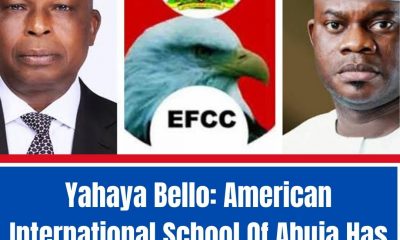
 News5 days ago
News5 days agoYahaya Bello: American International School Of Abuja Has Transferred $760,910.84 To EFCC Out Of $845,852
-
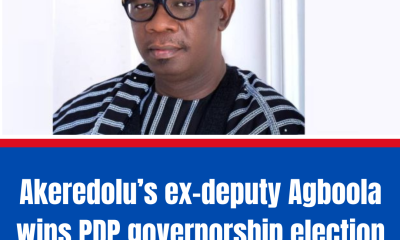
 Politics6 days ago
Politics6 days agoONDO 2024/ Akeredolu’s ex-deputy Agboola wins PDP governorship election primary.
-
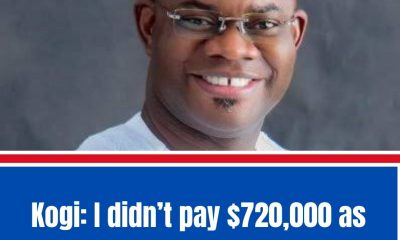
 Politics5 days ago
Politics5 days agoKogi: I didn’t pay $720,000 as school fees – Yahaya Bello
-

 Business6 days ago
Business6 days agoCustoms Area 1 Ph Hits N43 Billion Revenue Generation in first Quarter of 2024
-
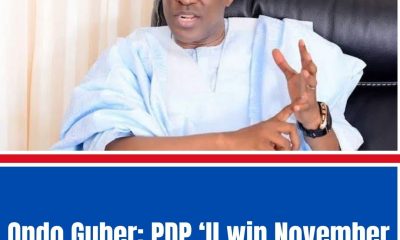
 Politics5 days ago
Politics5 days agoOndo Guber: PDP ‘ll win November election — Jegede
-
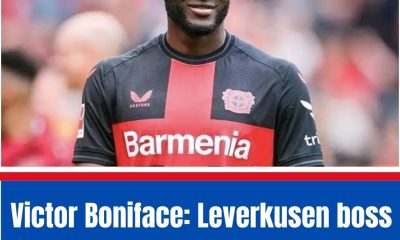
 Sports6 days ago
Sports6 days agoVictor Boniface: Leverkusen boss Alonso makes you ‘up your game’
-

 News5 days ago
News5 days agoWhy people do strange, incredible things for love – Psychologist
-

 Entertainment5 days ago
Entertainment5 days agoDavido on earning $1.3 million after NY performance




